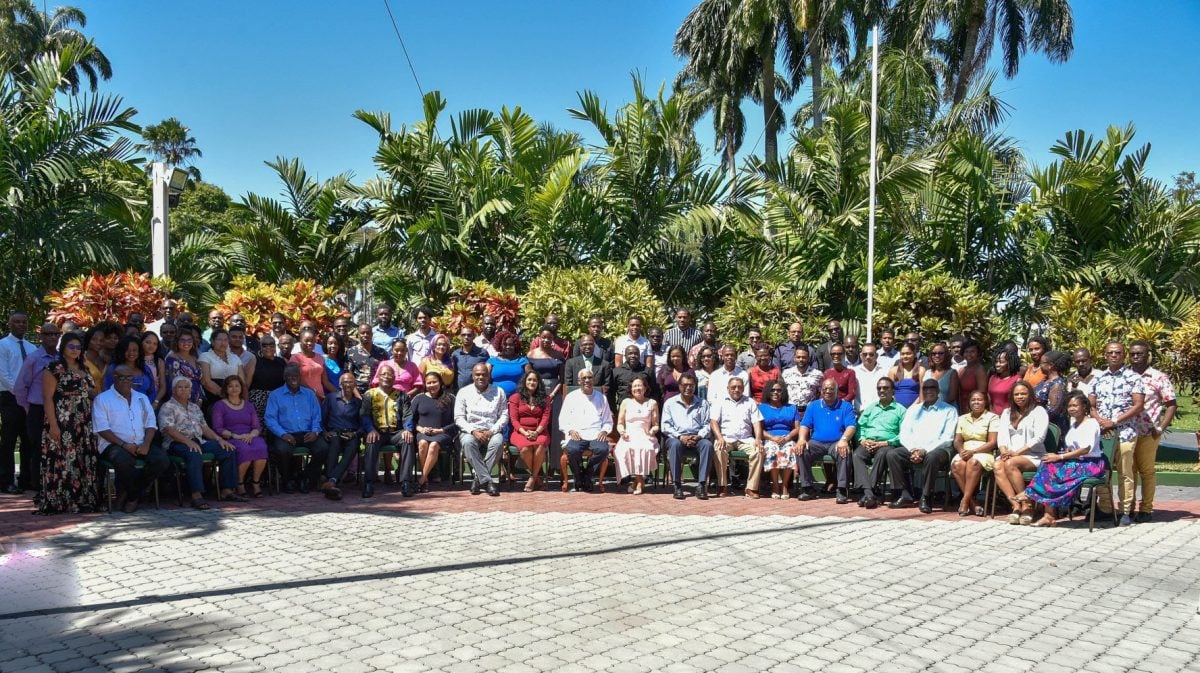With the Guyana Press Association (GPA) celebrating its 75th anniversary this year, President David Granger has said a book on the history of the local press will be published this year and recommitted to providing funds for the training of media operatives.
“I promised last year that this anniversary year I will assist the press association to publish the history of the press in Guyana. It is here, more or less…so it will be out sooner rather than later,” Granger said yesterday, according to a transcript of his remarks released by the Ministry of the Presidency. He was speaking at the annual media brunch he hosts at State House.
The president, who is performing the functions of a caretaker until general elections on March 2nd, said that the book currently runs to about 134 pages and is arranged into four main parts with the fifth part still to be completed. According to the transcript of his remarks, Granger said that the first part is called the ‘status’ part and relates to the colonial era between 1793 and 1840, which was dominated by the planter class at that time.
He added that from the time of Emancipation, there was a pluralist phase of the press between 1840 and 1940. “At that time, there were Portuguese newspapers in Portuguese language; African newspapers; Indian newspapers, in addition to other news outlets. So it was a very complex period in which the people who are coming to Guyana under different means, either those in Indentureship, those in enslavement or other migrants, wanted to express themselves, so during this period between 1840 and 1940 there were a lot of ethnic papers in which people articulated their grievances and expectations of different ethnic groups as well as other business groups and so on,” he was quoted as saying.
The president said that the third phase, from 1940 to 1970, is the nationalist period during which Guyanese, like other people in the Caribbean, yearned for independence. He said that this is reflected in the newspapers of that period.
After that, he said, there was a 20-year socialist period between 1970 and 1990. “This is the time when we saw, some of you may recall, development support communication. This is the time of the new international information order around the world, not just in Guyana, but people felt that the domination of the international media by Reuters, by Agence France-Presse, other big companies in the developed countries did not adequately represent the views of the newly independent states so the new international information order was meant to give voice to the newly independent countries and Guyana was part of that,” the president was reported as saying.
He said after that, a reformist period began from 1990 and continues to date. He observed that this period is marked by greater liberalisation and the emergence of completely new media which were unheard of before.
“So, those are the five phases of the evolution of the media in Guyana and this book will deal with most of what I have discussed just now. Unfortunately, my present occupation doesn’t give me the opportunity to do the research which I would like to do and much of the writing here will conclude in the first decade of this millennium, but I will complete it,” Granger said.
“I’ve just had some discussions with [GPA President Nazima Raghubir] and she seems to be doing some work on her own and we will see if we could maybe add to it so that new entrants into the profession will be guided by what occurred in the past and will try to make the future much better,” he added.
Meanwhile, Granger said that although the Minister of Finance has been unable to introduce a budget for 2020, he still holds to his pledge that “I am prepared to make an annual subvention to the Guyana Press Association coming from my funds called the National Endowment For Science and Technology (NEST) to assist the Guyana Press Association without any interference from me or the government to conduct training in the course of 2020.”
The President also took a jab at the GPA over a dispute in November last year. When he had been questioned about the reduction of state advertisements to Stabroek News, Granger had stated that fairness in reporting should be a factor in the allocation of ads. The GPA’s riposte to this statement was that it appeared that Granger was linking the allocation of state advertising with favourable coverage of his administration. The Ministry of the Presidency then accused the GPA of misrepresenting the president’s position and demanded a retraction and apology. The GPA stood by its statement.
In his remarks yesterday, Granger said “I brought along this Pocket Oxford Dictionary and Thesaurus, your president asked if I would make a presentation to her or to the media and well, I just opened it at ‘F’ – fair: treating people equally; equitable, honest, impartial, unbiased, unprejudiced, neutral, even-handed. Can you imagine? When somebody speaks of fairness they are speaking about impartiality, unbiased, unprejudiced, neutral, even-handed.
“On the other hand, on the same page you have ‘fake’. ‘Fair and ‘fake’. Fake: counterfeit, forged, fraudulent, sham, pirated, false, bogus. I would urge that before we issue statements, we check with this little book – I will leave it with Nazima – and see what fair means I would urge that your statements in future be guided by accurate representation of the words of the President”.






